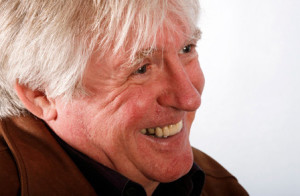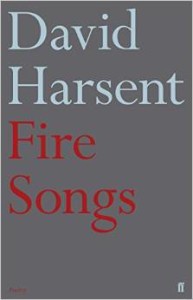Last week I discussed I Knew the Bride by Hugo Williams, shortlisted but not the winner of the T.S. Eliot Prize of the Poetry Book Society, founded in 1953 by T.S. Eliot and friends. In the UK, this is the poetry prize to win, carrying with it a 20, 000 pound award (about $36, 000). I was so taken with Williams’ poems that I wondered just how good the winner was.
So I read it: Fire Songs by David Harsent.
It begins with what is undoubtedly a fire song – “Fire: a song for Mistress Askew” – a rather graphic account of a woman being burned at the stake, with enough Old English lines worked in to add an air of historic reality. (As it turns out, Mistress Anne Askew, a Protestant poet, was arrested several times, found guilty of heresy and, after torture in the Tower of London, burned at the stake in 1546. She was 26.
You read Harsent’s poem, and you suffer alongside Mistress Askew. And it is a long poem.
The poetry in this collection, his eleventh, is vivid, startling, and engaging. At some points he seems to be speaking a new kind of language, one filled with such sharp images that it almost leaves you breathless.
This is poetry about England and its history, and poetry about England and its contemporary state – especially its state of the environment.
“Bowland Beth” is a poem about a bird, a hen harrier, and was commissioned for The Sparrowhawk’s Lament: How British Breeding Birds of Prey Are Faring by David Cobham. The hen harrier is the focus of a bird breeding project in the Bowland Forest in Lancashire in northwestern England. Read it for the beauty of Harsent’s words, and the harsh reality of what he’s describing.
That she made shapes in air
That she saw the world as patterns and light
moorland to bare mountain drawn by instinct
That she’d arrive at the corner of your eye
the ghost of herself going silent into the wind
That the music of her slipstream
was a whisper drone tagged to wingtips
That weather was a kind of rapture
That her only dream was of flight forgiven
moment by moment as she dreamed it
That her low drift over heather quartering home ground
might bring anyone to tears
That she would open her prey in all innocence
there being nothing of anger or sorrow in it
That her beauty was prefigured
That her skydance went for nothing
hanging fire on plain air
That her name is meaningless
your mouth empty of it mind empty of it
That the gunshot was another sound amid birdcall
a judder if you had seen it her line of flight broken
That she went miles before she bled out

Every poem in the collection is just as arresting, whether it’s about describing the travels of a rat as a kind of social commentary (“Sang the Rat”), poems that use tinnitus (that “white noise” sound you hear in your ear as you age) as a metaphor, or the poem entitled “Icefield” that uses words like cold knives.
In short, Fire Songs is simply stunning.
In an audio recording, Harsent reads from Fire Songs at the T.S. Eliot Prize awards program in London on Jan. 11:
Related: David Harsent: A Life in Writing (The Guardian)
Photo by krystian_o, Creative Commons, via Flickr. Post by Glynn Young, author of the novels Dancing Priest and A Light Shining, and Poetry at Work.
Want to brighten your morning coffee?
Subscribe to Every Day Poems and find some beauty in your inbox.
- “Horace: Poet on a Volcano” by Peter Stothard - September 16, 2025
- Poets and Poems: The Three Collections of Pasquale Trozzolo - September 11, 2025
- Poets and Poems: Boris Dralyuk and “My Hollywood” - September 9, 2025


Maureen Doallas says
‘Bowland Beth’ is beautiful, a wonderful introduction to this poet, Glynn.
Glynn says
Maureen, thanks for the comment. And it’s just one of the beautiful poems in the volume.
Sandra Wirfel says
I found this article interesting, David Harsent was not a poet I had heard of, previously, so I did what I always do, I googled his name and spent over an hour reading about him, his life and his poetry, read some of his poems and then stumbled across another article called A Life in Writing:
http://www.theguardian.com/culture/2011/feb/21/david-harsent-life-writing-poetry
I loved the way he finished with this quote
“But the most important thing for me was arranging things to maximise time for poetry, the realisation that the only work that matters is whatever gets you the next book”.
I really liked the way David used the word “That” to begin each sentence.
I agree with the comment that “the sharp images almost leave you breathless”
Nice way to introduce me to a new poet. Thanks.
Glynn says
Sandra, I wasn’t familiar with his poetry, either. I was intrigued by what poetry could have won the Eliot Prize over the volume by Hugo Williams. Harsent is a wonderful poet.
Michele Karas says
I am so thrilled to be introduced to this incredible poet! Thank you, Glynn, for posting “Bowland Beth” in its entirety. It’s imagery is at once blade-sharp and graceful, like the silent, lethal strike of a samurai, “That the gunshot was another sound amid birdcall.” I look forward to knowing David Harsent’s work more intimately.
Glynn says
Thanks for reading the post, Michele. All of the poems in Fire Songs are like this.
Elizabeth W. Marshall says
Michele, welcome to this community of poetry lovers. Honored to have you reading here. Come back again, won’t you. Glynn’s posts are some of the best.
If you have any questions, just ask. @graceappears
You have officially been welcomed. 🙂
Make yourself at home. We are glad you stopped by.
Sandra Heska King says
Michele! You are a new face to me here. (Not that I can see your face.) I see Elizabeth has already welcomed you to the table. May I offer you some cinnamon toast and tea? I hope you’ll linger awhile.
Elizabeth W. Marshall says
Glen I am intrigued by this on many levels. Thanks for the introduction.
Sandra Heska King says
This is stunning, Glynn. That last line jolted me.
Sandra Heska King says
Of Bowland Beth…
Sylva Portoian, M.D says
“Fire Songs”…
The title is poetic and beautiful…
it is true the Poets fire their their stanzas
from their cardiocytes ,,,
after electrifying their astrocytes
and extending their roads to dendrites…
That fire…no one can cool them down.
Sylva~MD~Poetry